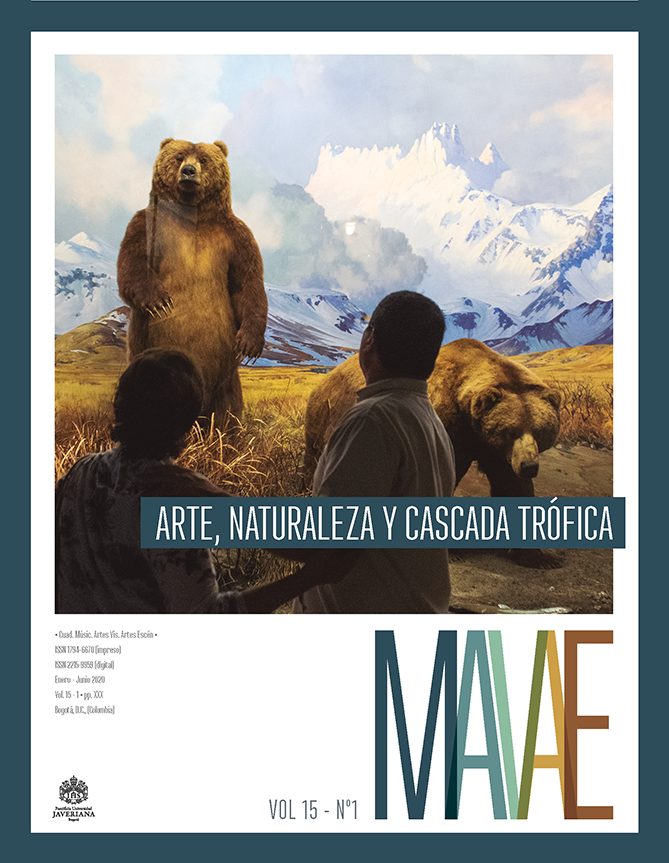Poetics of Others: Cannibal Resistance to Total War
##plugins.themes.bootstrap3.article.details##
This essay is another exercise in understanding our present based on the anthropophagic proposals of Oswald de Andrade, Suely Rolnik, and Viveiros de Castro, among others. We will see if, along the way, we allow ourselves or are forced to experiment with some ways of being that, between forms and forces (Rolnik), do not have to be governed by the devices of alienation and exploitation to which global capitalism wants to accustom us. Here, we aim to rethink, above all, the continuity between the ethical and the political issues. From anthropophagic enunciation, this continuity opens us up to a peculiarly cosmic idea about the community and about ourselves that breaks the socio-atomic project that threatens to totalize the world. The predation demands that we pursue and develop in our relationship with the land and with others to meet the standards of information societies in the context of advanced capitalism, forces us (right?) to stop and reflect. At this point, the cannibal line has the advantage of providing us with a special style to carry out this much needed reflection. It is the poetic mode, from which thought becomes aware, not only of its creative and performative powers, but of its dislocation and breaking power of a few gripping, perhaps too human, logic.
anthropophagy, cannibalism, subjectivity, capitalism, total war, aesthetic resistanceantropofagia, canibalismo, subjetividad, capitalismo, guerra total, resistencia estéticaantropofagia, canibalismo, subjetividade, capitalismo, guerra total, resistência estética
Agamben, Giorgio. 2004. “El estado de excepción”. Archipiélago: Cuadernos de crítica de la cultura 60: 101-110.
Andrade, Oswald de. 1928. “Manifiesto antropófago”. Revista de Antropofagia 1 (1).
Arendt, Hannah. 1993. La condición humana. Barcelona: Paidós.
Aristóteles. 2000. Política. Introducción, traducción y notas de Tomás Calvo Martínez. Madrid: Gredos.
Castro, Eduardo Viveiros de. 2010. Metafísicas caníbales: líneas de antropología postestructural. Buenos Aires: Katz.
Cornejo-Polar, Antonio. 1996. “Una heterogeneidad no dialéctica: sujeto y discurso migrantes en el Perú moderno”. Revista Iberoamericana 62 (176): 837-844. https://doi.org/10.5195/reviberoamer.1996.6262
Foucault, Michel. 2002. Historia de la sexualidad. Vol. 2: El uso de los placeres. México: Siglo XXI.
Foucault, Michel. 2005. La herméneutica del sujeto. Madrid: Akal.
Foucault, Michel. 2012. The History of Sexuality. Vol. 2: The Use of Pleasure. Nueva York: Vintage.
Guattari, Félix y Gilles Deleuze. 1994. Rizoma. México: Diálogo Abierto.
Hobbes, Thomas. 2001. Leviatán. Madrid: Alianza.
Marx, Karl. 1980. El capital. México: Siglo XXI.
Morales Saro, Cristina. 2018. “Cannibal Feminism”. Tesis de maestría, Utrecht University.
Mouffe, Chantal. 2014. Agonística: pensar el mundo políticamente. Buenos Aires: Fondo de Cultura Económica.
Preciado, B. Paul. 2009. “Queer: History of a Word” Parole de Queer (blog), 27 de octubre de 2019. http://paroledequeer.blogspot.com/p/english.html
Rolnik, Suely. 2007. “Antropofagia zombie”. Brumaria8: Arte y Revolución. Sobre historia(s) del arte, Documenta 12.
Rolnik, Suely. 2009. “Políticas del fluido híbrido y flexible: para evitar falsos problemas”. Nómadas 31: 157-164.
Rolnik, Suely. 2014. “Micropolíticas del pensamiento: sugerencias a quienes intentan burlar el inconsciente colonial“. Trabajo presentado en Descolonizar el Museo, Barcelona, España, 27 de diciembre.
Scherbosky, Federica. 2010. “La subjetividad antropofágica: aportes para una concepción devorativa de la vida”. Estudios de filosofía práctica e historia de las ideas 12 (2): 23-31.
Schmitt, Carl. 2002. El concepto de lo político. Traducido por Alexandre Franco de Sá. Madrid: Alianza.
Tiquun. (2015). La hipótesis cibernética. Buenos Aires: Hekht.
Vargas Cervantes, Susana. 2016. “Queer, cuir y las sexualidades periféricas en México”. Horizontal.


